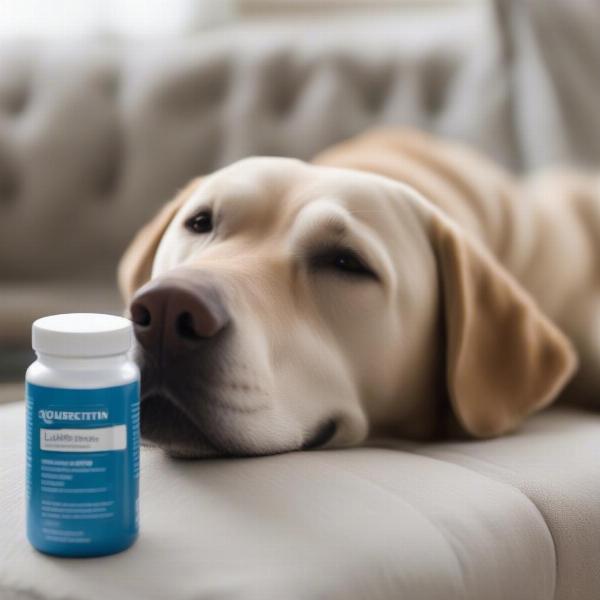Quercetin for dogs has gained popularity as a natural supplement with potential health benefits. This article explores the uses, dosage, and safety of quercetin for your canine companion, providing you with the information you need to make informed decisions about their care. We’ll delve into the science behind quercetin and how it might help manage certain conditions in dogs.
Understanding Quercetin and its Potential Benefits
Quercetin is a flavonoid, a type of antioxidant found naturally in various fruits, vegetables, and grains. It’s known for its anti-inflammatory, antihistamine, and antioxidant properties. For dogs, quercetin is often considered for its potential to help manage allergies, arthritis, and certain inflammatory conditions. However, it’s important to understand that while anecdotal evidence and some preliminary research suggest potential benefits, more conclusive studies are needed to confirm these effects in dogs.
Allergies and Quercetin
Many pet owners turn to quercetin to help manage their dogs’ allergies, hoping to alleviate symptoms like itching, skin inflammation, and excessive licking. Quercetin’s antihistamine properties may contribute to this effect, potentially reducing the release of histamines, which are responsible for many allergy symptoms.
Arthritis and Inflammation
Quercetin’s anti-inflammatory properties might also offer relief for dogs suffering from arthritis and other inflammatory conditions. By modulating inflammatory pathways, quercetin may help reduce pain and improve mobility. However, it’s crucial to consult with a veterinarian before using quercetin for these conditions, as it shouldn’t replace prescribed medications without professional guidance.
 Dog with arthritis taking quercetin
Dog with arthritis taking quercetin
Dosage and Administration of Quercetin for Dogs
Determining the appropriate dosage of quercetin for your dog is crucial and should always be done in consultation with a veterinarian. Factors such as the dog’s weight, age, overall health, and the specific condition being addressed can influence the recommended dosage. A general guideline is 5-10mg per pound of body weight, divided into two daily doses. However, your veterinarian can provide a tailored recommendation based on your dog’s individual needs. Quercetin supplements for dogs are available in various forms, including capsules, tablets, and chews. best quercetin for dogs can help you to understand the different products on offer and how to choose a safe one.
Dr. Emily Carter, DVM, suggests:
“Always discuss quercetin supplementation with your veterinarian. They can help determine the appropriate dosage and monitor for any potential side effects.”
Safety and Potential Side Effects of Quercetin
Quercetin is generally considered safe for dogs when administered at appropriate dosages. However, some dogs may experience mild side effects, such as gastrointestinal upset, including vomiting and diarrhea. In rare cases, more serious side effects like kidney damage have been reported. Always start with a lower dose and gradually increase it as directed by your veterinarian. quercitin for dogs goes into further detail about the safety of quercetin for dogs.
What are the signs of a quercetin overdose in dogs?
Signs of a quercetin overdose in dogs can include severe vomiting, diarrhea, lethargy, and changes in urine output. If you suspect your dog has overdosed on quercetin, seek immediate veterinary attention.
Conclusion
Quercetin may offer potential health benefits for dogs, particularly in managing allergies and inflammation. However, it’s essential to consult with your veterinarian before administering quercetin to your dog. They can determine the appropriate dosage, assess potential risks, and monitor for any adverse reactions. Remember that while natural supplements can be helpful, they should be used responsibly and under the guidance of a qualified veterinary professional. quercetin and bromelain for dogs is an informative resource to help you to further explore other supplements you can give your dog alongside quercetin.
FAQ
- What is quercetin used for in dogs? Quercetin is primarily used for its potential anti-inflammatory and antihistamine properties, often to manage allergies and certain inflammatory conditions.
- Can I give my dog human quercetin supplements? No, it’s best to use quercetin supplements specifically formulated for dogs. Human supplements may contain ingredients that are harmful to dogs.
- How much quercetin should I give my dog? The dosage should be determined by a veterinarian based on your dog’s individual needs.
- What are the side effects of quercetin in dogs? Side effects are generally rare but can include gastrointestinal upset.
- Is quercetin safe for all dogs? While generally safe, it’s essential to consult with a veterinarian before giving quercetin to your dog, especially if they have underlying health conditions or are taking other medications.
- Can quercetin cure my dog’s allergies? Quercetin is not a cure for allergies but may help manage symptoms.
- Where can I buy quercetin for my dog? Quercetin supplements for dogs can be purchased from reputable pet stores, online retailers, and veterinary clinics. quercetin dosage for dogs offers additional information on the right dose for your dog and where to find quercetin.
ILM Dog is your trusted global resource for dog care and well-being. We offer expert advice on Breed Selection, Dog Health & Medical Care, Training & Behavior, Nutrition & Feeding, Grooming & Hygiene, and Products & Accessories. Whether you’re a new dog owner or a seasoned expert, we provide practical and reliable information to help you navigate every aspect of dog ownership. Contact us at [email protected] or +44 20-3965-8624 for personalized guidance. Visit ILM Dog today!